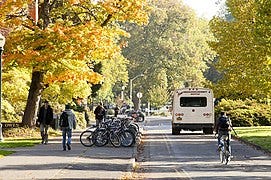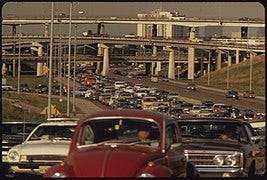Car-optional environments are key to liberal electorates
Needing a car is anathema to setting good societal priorities
While prices rule the market-based economy, few are advertised on every main drag in town in bright digital numbers. The impact of gas prices on presidential approval has been broadly studied. However, this impact is not party-neutral: gas prices may go up or down somewhat randomly and thus can in theory favor presidents from either party, the dependence most Americans have on gasoline and on automobiles generally is ultimately illiberal in nature.
For one thing, car dependence necessitates investment in roads and highways that suffer more acutely from congestion as more drivers arrive. While public transit can also be overloaded, in most cases an increase in ridership is actually beneficial to the network, bringing in more money and public support. As a result, a system with adequate transit is likely to adopt an abundance mindset - newcomers take up less space and are thus less likely to be seen as a burden. Moreover, while transit takes a great deal of capital to improve - add more locomotives, more buses, more tunnels, etc, investment in car infrastructure requires more *land*, which is fundamentally a finite resource. The perceived need to bulldoze another lane on the highway every time new people move to town can make the most socially liberal resident into a Malthusian (with a green veneer, of course), undercutting the urban development and openness to change and migration that are crucial to a truly liberal society.
Finally, if it is essential to own a car, people will buy them, learn how to drive, and organize their lives around them. Part of the result? people live further from the centers of town. Cars facilitate exurbs, and when even urban areas are relatively care dependent, the reasons to stay in town shrink drastically. A ten minute drive to work on crowded streets, including time spent parking, is not that much more appealing than a twenty minute drive to work on the highway. However, when living in town opens up the option of walking or biking to work, or taking clean and convenient transit, the arguments for living in town - even if town is a relatively small one - grow. And as more people choose to live in closer proximity to one another, everyday social interactions grow, small scale businesses flourish, and a society more open to liberalism in the broadest sense is fostered.
There are a myriad of reasons rooted in equity and efficiency to construct cities where driving is an option, not a necessity, but those wishing to see the development of a liberal democracy have several additional ones. Cars are often associated with freedom and individualism, but in fact liberalism itself thrives when people have to option to forgo commuting in individual boxes.



Very good and useful thoughts, Matthew. It's imperative that we invest in mass transit systems that reduce our dependence on the automobile.
Your essay helps me to finally answer a question from opponents and skeptics of more short-distance or local passenger trains.
Here in southern Louisiana, a question that gets raised when we are discussing a commuter train between Baton Rouge and New Orleans is, why, since probably not a huge amount of people will use the train, not just subsidize some bus service along the route in question? While it's true that passengers on a bus take up less space than they would if they were traveling in regular personal automobiles, they are still taking up space on highways and still congested and delayed by others using the highways.